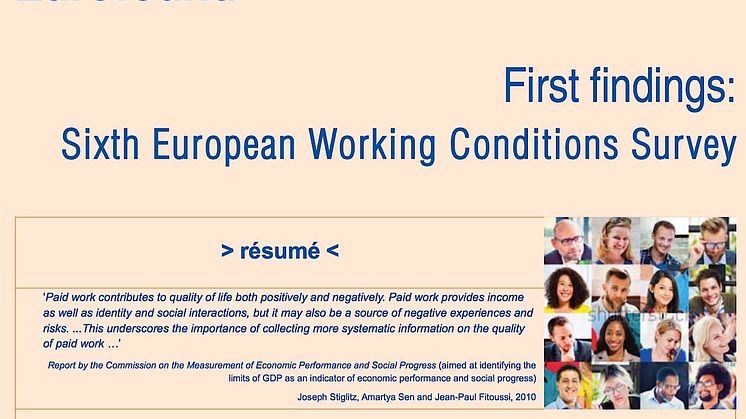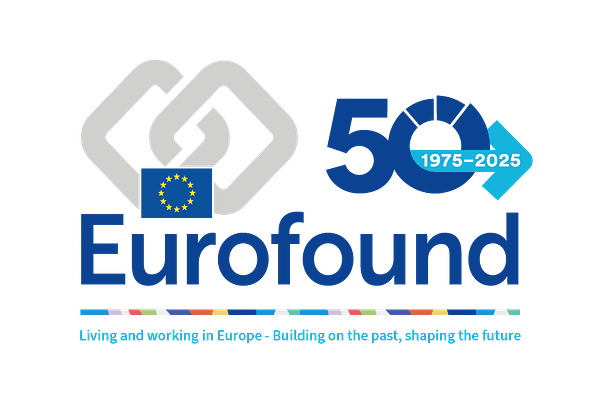
Press release -
Survey shows diverse picture of Europe at work - but with some positive developments
(Dublin, Ireland): Most workers are satisfied with their working time (58%), feel supported by their manager (58%) and colleagues (71%) and say their organisation motivates them to give their best job performance (63%). At the same time, while female managers are on the increase, gender segregation remains persistent across the European labour market, younger workers experience greater work intensity and job insecurity, older workers report less access to training, physical risks remain and there are significant differences in job quality across occupations.
These are just some of the first findings from Eurofound’s 6th European Working Conditions Survey which presents a diverse picture of Europe at work over time across countries, occupations, gender and age groups. It underlines the complex reality with which Europe’s policymakers are confronted as they seek to build a fair and competitive Europe in an increasingly digitalised global economy. The 6th EWCS first findings are presented for the first time today at a joint high-level event with the Luxembourg EU Presidency.
The survey confirms a differentiated picture on working time: working hours continue to decrease, numbers working ‘part-time’ have increased and the self-employed work longer hours than employees. While fewer workers are working 48 hours or more, the number of workers working part-time (both 21-34 hours and 20 hours or less per week) have increased over time. While the overall gender gap has decreased, it remains significant, with men on average working 39 hours and women 33 hours a week in their main paid job. Overall, women’s working hours are longer when the paid and unpaid working hours are combined.
The findings also highlight gender differences as a continuing feature of the European labour market. While the proportion of employees who report having a female supervisor has increased from 24% in 2000 to 33% in 2015 gender segregation remains a persistent feature with over half of all workers reporting that they share their job title mainly with workers of the same sex as themselves (58% for men, 54% for women).
Only one in ten workers (10%) say they are not (very) well informed about the health and safety risks related to the performance of their jobs. Overall, the percentage of workers reporting that their health is at risk because of their work has declined to 23% in 2015 from 31% in 2000.
Violence in the workplace, however, can take many different forms and is a major risk for mental health. Almost one in six workers (15%) reports having been subject to adverse social behaviour – such as acts of violence, harassment and unwanted sexual attention – with potentially serious negative consequences for the workers concerned.
The proportion of training paid for by the employers has increased over the past decade. Young employees are more likely to learn new skills at work than older workers. Workers over 50 report lower prospect for career advancement and less training opportunities.
’Whether we work to live or live to work, we all spend significant amounts of time at work. ’ says Juan Menéndez-Valdés, Eurofound’s Director. ’How do we feel about work? Do we enjoy it, feel appreciated, secure, and do we have a say in our own work? The sixth European Working Conditions Survey from Eurofound seeks to answer these questions.’
The EWCS is a wide-ranging survey of workers carried out by Eurofound every five years since 1991 and is a unique tool to measure job quality in Europe (and beyond). The survey interviews employees and self-employed workers face-to-face about key issues related to their work and employment. The sixth edition of the EWCS was carried out in 2015 in 35 countries. The EU28 analysis is based on 35,765 interviews. The questionnaire covers employment status, physical and psychosocial risks, time and place of work, work organisation, skills use and development, social relations at work, as well as health and well-being.
Download the First Findings here
Find all the questions and answers to the 6th EWCS across all countries, by age, income and sex on Eurofound’s data visualisation tool here
Click here for more information about Eurofound’s European Working Conditions Surveys
For further information, contact:
Related links
Topics
The European Foundation for the Improvement of Living and Working conditions (Eurofound) is a tripartite European Union Agency, whose role is to provide knowledge in the area of social and work-related policies. Eurofound was established in 1975 by Council Regulation (EEC) No. 1365/75.
For more information about Eurofound and its work, and free access to all our data and findings, visit our website and follow us on these social media channels: Twitter, LinkedIn, Facebook, and YouTube.

